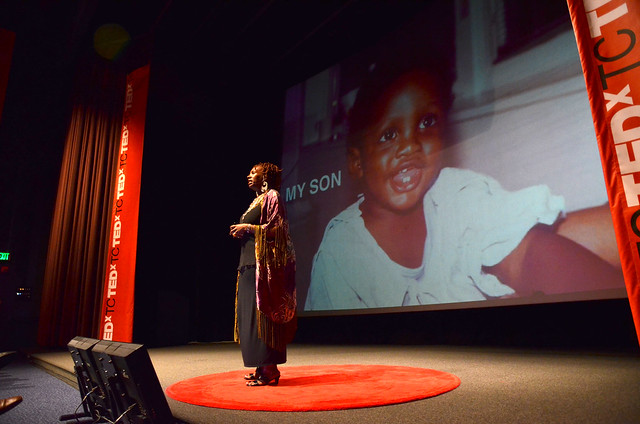 Among the varied insightful voices at the TEDxTC event Monday night in St. Paul, I had the distinct privilege of listening to the talks of two giants working on the intersection of food and justice: Winona LaDuke, activist and author from the White Earth Reservation, and LaDonna Redmond, originally hailing from Chicago but recently joining our IATP team here in Minneapolis. Each activist cut the issue of food justice in a personally, culturally and geographically relevant way, and each story resonated close to what our relationship with food could be.
Among the varied insightful voices at the TEDxTC event Monday night in St. Paul, I had the distinct privilege of listening to the talks of two giants working on the intersection of food and justice: Winona LaDuke, activist and author from the White Earth Reservation, and LaDonna Redmond, originally hailing from Chicago but recently joining our IATP team here in Minneapolis. Each activist cut the issue of food justice in a personally, culturally and geographically relevant way, and each story resonated close to what our relationship with food could be.
Winona shared the experience of her people, the Anishinaabeg (Ojibwe). Until around one hundred years ago, the Anishinaabeg were entirely food secure and self-sufficient. Diabetes, heart disease and the other rampant afflictions of our modern industrial diet were unheard of. But what's more, the relationship the Anishinaabeg had with their food was truly that: a relationship. Winona expressed that "all food comes from our relatives, whether those with fins, legs or roots." That familial relationship with food continues to this day, despite European colonists, and the American government that followed, working to forcefully eradicate it. With the rise of genetic engineering and the patenting of life, a new kind of threat emerged to that relationship. Winona recounted the stories of the Anishinaabeg's successful fight to preserve Manoomin, or wild rice, against genetic engineering, the success of the Native Hawaiians fight to protect the taro root from genetic modification, and the success of the Maori's fight to preserve the peruperu potato against genetic patenting. So, all of these fights were against commodification, against yet another strain of colonization, and against inappropriate technologies, but what were they for? The answer from Winona was that it's a fight for family, culture and spirit every time: "These are the stories of our relatives with roots."
Where Winona outlined the workings of the food system on cultures, peoples and extended families, LaDonna illustrated the perils of a broken food system beginning through a personal lens. LaDonna shared how she had not been active in the food system until her son was born with extensive food allergies. What was previously a ten-minute stop at the supermarket now became hours-long excursions. She first attempted to decode the labels at convenience stores, then stuck to the perimeter of grocery store aisles, then, learning more about pesticides, antibiotics and genetic modification, was forced to take trips far outside of her neighborhood for healthy food for her family. This galvanized her interest in food access and urban agriculture activism, setting up local farmers' markets, small co-op grocery stores and urban CSA deliveries. Yet, as a now-seasoned food justice activist, she realized the solutions were not to scale. Even with community gardens and new fresh produce stands all around, LaDonna's neighbors were not able to choose healthier food due to income, familiarity or assistance barriers. It also remains possible to purchase a jar of salsa made from local, organic produce, but not possible to know the work conditions, pay, or treatment of the workers who planted, picked and processed the produce. As LaDonna explained, "there is only one food system," and it's impossible to buy or choose your way out of it, so there is still much work to do. And to what end? LaDonna answered in this way: She used to believe that, as a mother, she was there to protect her son's potential and allow it to bloom. Instead, she realized that her son came into her life to help her own potential bloom—that of reconnecting with the land and the earth, of rediscovering the spirit and soul of relating with food, and of loving self, family, and local, global and ecological community.
Each of these stories demonstrated the true depth of our relationship with food, a depth we’ve lost in our current broken system. Rather than merely a boxed commodity to be purchased at the local grocery store, food literally sustains our lives, and food that is culturally, geographically and healthfully appropriate helps us thrive in our lives. Each speaker challenged us to reflect on this vision and turn the questions on ourselves: What is our own story around food? How are we relating with our food? What is our potential to achieve with and through food? And, from those reflections, what is the work we must set ourselves to? Is it understanding the farm bill, creating viable funding for agriculture to adapt to climate change instead of current faulty proposals, starting a business that respects farmers, consumers, and the land, or some other way to get our hands in the dirt? As Winona’s father once put to her, "You're a really smart woman, but I don't want to know your philosophy if you can't grow corn."
